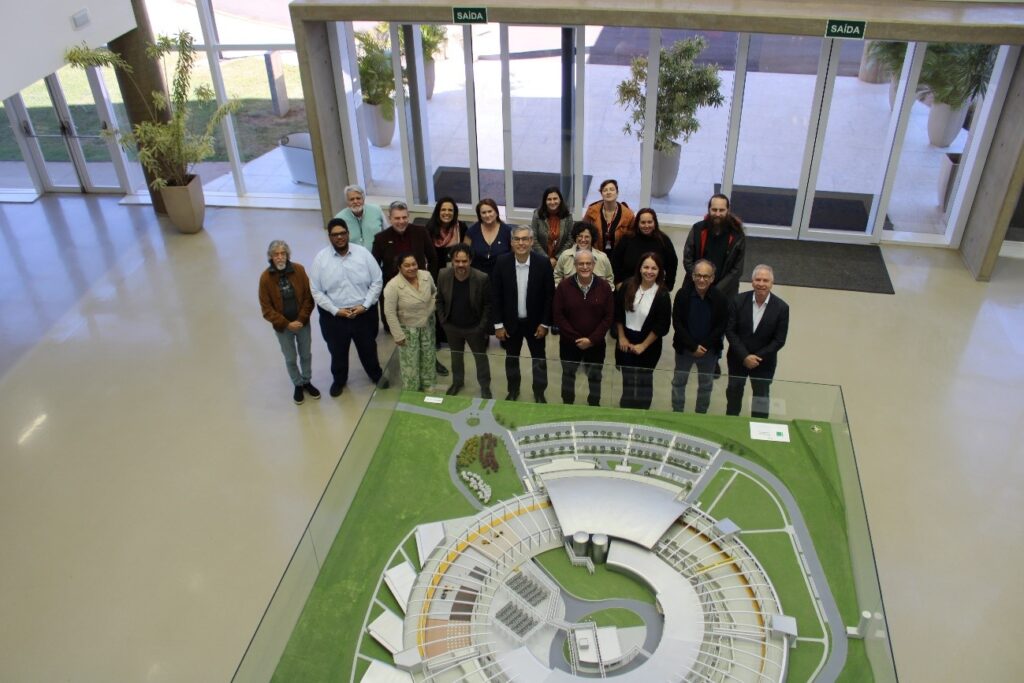Nine members of the Ministry of Education (MEC) were in Campinas on July 29 and 30 to visit the Brazilian Center for Research in Energy and Materials (CNPEM, which is funded by the Ministry of Science, Technology and Innovation) and the Center’s academic arm, the Ilum School of Science, as well as to participate in meetings and presentations. The group was received by CNPEM Director General José Roque, Ilum Director Adalberto Fazzio, and the coordinators of Ilum and other divisions of CNPEM. The main objective of the visit was to establish dialogs on topics of common interest and to introduce the Center’s facilities to the Ministry via guided tours.
The MEC staff that participated in the event were Secretary for Higher Education Adilson Santana de Carvalho, Director of Distance Education for CAPES Antônio Carlos Rodrigues de Amorim, Secretary of Professional and Technical Education Claudio Alex Jorge da Rocha, Coordinator General for Ministry Interests Emanoele Vanessa Cortes Ribeiro, Project Manager Jaqueline Ribeiro Silva, Coordinator General for Assessment Natália Aurélio Vieira, Director for Teacher Training and Promotion of Educational Professionals Rita Esther Ferreira de Luna, and Program Director for MEC’s Executive Secretariat Alexandre Brasil.

“We were eager to welcome this delegation from the Ministry to learn more about CNPEM and especially so we could show them Ilum. It was excellent, MEC was represented by various departments. We defined several lines of activity and this semester we will develop some projects together which will be implemented over the coming years,” said Ilum Director Adalberto Fazzio.
In the morning of the first day of the event, the visitors presented the Ministry’s main policies and programs. In the afternoon, they were introduced to CNPEM’s scientific competencies in the areas of health, energy, new materials and sustainability, and also visited the Sirius particle accelerator and the Nanotechnology Laboratory.
The morning of the second day began with a visit to the Ilum School of Science. Director Adalberto Fazzio gave a presentation about the main topics involving the institution, and afterward the school’s coordinators guided the visitors through the school’s labs and other facilities.
Activities concluded on the afternoon of Wednesday the 30th at CNPEM, with a debate on how CNPEM could potentially support MEC in implementing and achieving public education policies.
The visit to Ilum left the MEC staff excited about the school’s innovative teaching concept. “It is an innovative project, from the point of view of the academic organization, admissions process, complete follow-up, the full-time learning experience in higher education, and the curriculum. It is an experience that could serve as a reference for others within the network,” said Adilson Santana de Carvalho, MEC’s Secretary for Higher Education.
About the Ilum School of Science
Ilum offers a free undergraduate degree program that utilizes an interdisciplinary approach to train scientists and professionals in science and technology. With an innovative educational model, the three-year full-time bachelor program offers courses that connect life sciences, materials science, data science, artificial intelligence, and the humanities in order to prepare researchers to work in an ethical and collaborative manner in the search for solutions to the global challenges of the twenty-first century. The Ilum School of Science is funded by the Brazilian Ministry of Education (MEC) and is part of the Brazilian Center for Research in Energy and Materials (CNPEM) in Campinas, São Paulo, a social organization overseen by the Ministry of Science, Technology, and Innovation (MCTI). Ilum’s educational mission offers early contact with experimental activities, in teaching labs at the school as well as at CNPEM, in projects carried out together with researchers.
About CNPEM
The Brazilian Center for Research in Energy and Materials (CNPEM) is home to a state-of-the-art, multi-user and multidisciplinary scientific environment and works on different fronts within the Brazilian National System for Science, Technology and Innovation. A social organization overseen by the Ministry of Science, Technology and Innovation (MCTI), CNPEM is driven by research that impacts the areas of health, energy, renewable materials, and sustainability. It is responsible for Sirius, the largest assembly of scientific equipment constructed in the country, and is currently constructing Project Orion, a laboratory complex for advanced pathogen research. Highly specialized science and engineering teams, sophisticated infrastructure open to the scientific community, strategic lines of investigation, innovative projects involving the productive sector, and training for researchers and students are the pillars of this institution that is unique in Brazil and able to serve as a bridge between knowledge and innovation. CNPEM’s research and development activities are carried out through its four National Laboratories: Synchrotron Light (LNLS), Biosciences (LNBio), Nanotechnology (LNNano), Biorenewables (LNBR), as well as its Technology Unit (DAT) and the Ilum School of Science — an undergraduate program in Science and Technology supported by the Ministry of Education (MEC).





